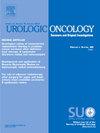Risk of de novo prostate cancer diagnosis after solid organ transplant: A retrospective claims-based matched cohort study
IF 2.3
3区 医学
Q3 ONCOLOGY
Urologic Oncology-seminars and Original Investigations
Pub Date : 2025-08-20
DOI:10.1016/j.urolonc.2025.07.026
引用次数: 0
Abstract
Introduction
Immunosuppression in solid organ transplant patients raises concerns for de novo cancer development. However, research has been limited by small sample sizes or lack of matching. This study used a claims database to assess risk of prostate cancer in transplant patients compared to the general population.
Methods
The TriNetX Research Network was queried for men without history of prostate cancer who underwent solid organ transplant (kidney, heart/lung, liver, or pancreas) between ages 50–59, 60–69, and 70–79. Transplant patients were matched by age and PSA-screening to controls who did not have a history of solid organ transplant or prostate cancer.
Results
After matching, there were 59,701 patients in each arm for the 50–59 cohort, 66,801 per arm for the 60-69 cohort, and 34,187 per arm for the 70–79 cohort. For all 3 transplant cohorts, the relative risk of a prostate cancer diagnosis was significantly lower than for their age-matched controls through 10 years after solid organ transplant. When stratified by organ type, men with kidney or liver transplants had a lower risk of prostate cancer compared to controls. Men with heart/lungs or pancreas transplants had risk similar to controls.
Conclusions
The decreased long-term risk of a prostate cancer diagnosis in transplant patients compared to matched controls highlights the likely value of pretransplant PSA screening and the lack of any clearly increased prostate cancer risk related to immunosuppressive medication in this population. Additional studies are needed to clarify any relationship between prostate cancer and transplantation and post-transplant screening recommendations.
实体器官移植后重新诊断前列腺癌的风险:一项基于索赔的回顾性匹配队列研究。
实体器官移植患者的免疫抑制引起了对新发癌症发展的关注。然而,研究受到样本量小或缺乏匹配的限制。本研究使用索赔数据库来评估移植患者与普通人群相比患前列腺癌的风险。方法:在TriNetX研究网络中查询了年龄在50-59岁、60-69岁和70-79岁之间接受过实体器官移植(肾、心/肺、肝或胰腺)的无前列腺癌病史的男性。移植患者按年龄和psa筛查与没有实体器官移植或前列腺癌病史的对照组相匹配。结果:匹配后,50-59组每组59,701例患者,60-69组每组66,801例,70-79组每组34187例。在所有3个移植队列中,在实体器官移植后10年内,前列腺癌诊断的相对风险显著低于同龄对照组。当按器官类型分层时,接受肾脏或肝脏移植的男性患前列腺癌的风险低于对照组。接受心脏/肺或胰腺移植的男性的风险与对照组相似。结论:与匹配的对照组相比,移植患者前列腺癌诊断的长期风险降低,这突出了移植前PSA筛查的可能价值,并且在该人群中没有任何明显增加与免疫抑制药物相关的前列腺癌风险。需要进一步的研究来阐明前列腺癌与移植和移植后筛查建议之间的关系。
本文章由计算机程序翻译,如有差异,请以英文原文为准。
求助全文
约1分钟内获得全文
求助全文
来源期刊
CiteScore
4.80
自引率
3.70%
发文量
297
审稿时长
7.6 weeks
期刊介绍:
Urologic Oncology: Seminars and Original Investigations is the official journal of the Society of Urologic Oncology. The journal publishes practical, timely, and relevant clinical and basic science research articles which address any aspect of urologic oncology. Each issue comprises original research, news and topics, survey articles providing short commentaries on other important articles in the urologic oncology literature, and reviews including an in-depth Seminar examining a specific clinical dilemma. The journal periodically publishes supplement issues devoted to areas of current interest to the urologic oncology community. Articles published are of interest to researchers and the clinicians involved in the practice of urologic oncology including urologists, oncologists, and radiologists.

 求助内容:
求助内容: 应助结果提醒方式:
应助结果提醒方式:


